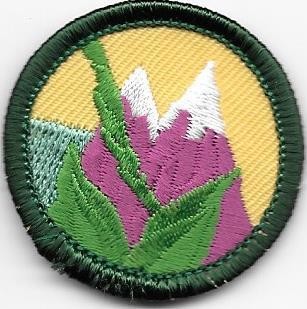Globe Trotting Green Border 2001-2010
Complete any six of the following requirements to earn this badge:
1. Picture It Every country's architecture is influenced by climate, the types of available materials, the number of people in an unit, and the amount of space available. Use an encyclopedia, magazines, videos, art books, or the Internet to find out about the types of architecture found in three very different places (for example, polar regions, desert communities, and a big city). Then sketch out the different designs, or create collages of photographs that show the differences in architecture.
2. Toot Your Own Horn Is your community a tourist destination? If it isn't could it be? Is the geographical setting dramatic? Are there cultural or historical sites that tourists could visit? Most communities have features that can lure visitors - like a spot where a famous moment in history occurred, a lake for fishing or swimming, or natural resources such as sulfur baths, geysers, or volcanic rock. Create a poster, a travel brochure, or a presentation highlighting your community's unique features.
3. Read All About It Read 2 or 3 short stories, or a book in which the setting (time and place) influences the plot. Some examples are Jean Craighead George's Julie of the Wolves, which is based in Alaska in the early part of the 20th. century; Madeleine L'Engle's A Wrinkle in Time, in which the characters move beyond the real world; and books by Laura Ingalls Wilder, which take place on the Western frontier. How does the setting influence the plot and the way the characters live and act? Now create your own opening to a story that takes place in a country other than the one you live in now. You can write it down on paper or act it out with friends.
4. Just a Drop Water is vital to life; nothing can live without it. Yet, lots of people live where drinkable water is limited, or almost nonexistent. One thing these people do is collect water during a rainstorm, and save it to drink, cook, and wash with later. During the next rainstorm, put out a big pot or bowl. How much water did you collect? Now consider how long it would take you to collect enough water to use in a day. Keep track of how many cups of water you drink every day, and how much water you use for cooking, cleaning, washing clothes, and bathing. (You can estimate how much is used in washing clothes and bathing.) What is the total? How many pots of water would you need to take care of your daily needs? Could you cut back on the amount of water you use?
5. Be Aware - Be Prepared Volcanoes, tornadoes, floods, earthquakes, hurricanes, fires, and droughts; every location has its challenges. Pick one of these natural phenomena and find out: - What causes it? - What can be done, if anything, to prevent it? - What can be done to prepare for it? - Where is it most common? - What types of assistance do people need if the phenomenon occurs in their community?
6. Map It Out Pick a country and become an expert on it. What are its major rivers, mountain ranges, and other geographical feature? What climate does it have? How does the climate affect what kinds of trees or plants grow there? How does it affect what farmers can grow there?
7. Dear Diary . . . Re-create the life of an explorer. Research how the person traveled and got fresh food supplies and water. What instruments of navigation were used? What was the explorer searching for? Why did the explorer leave home? Create a diary as if you were this person. Make diary entries for one week.
8. Is Anybody There? Investigate 3 ways that people in different parts of the world use technology to keep in touch. How common are these forms of technology in your community? How do they work? What are the advantages and disadvantages of these forms of technology?
9. We're All Connected Find out about a career in which people need to know about countries other than the United States. Get information from the internet, a book, or a magazine. Some examples of careers to look into are importer, buyer for a store, travel agent, travel writer, or stockbroker. How does knowledge of other languages and cultures help in these careers?
10. It's All Yours Do you love the mountains, or would you rather be at the ocean? Create a geographical locale that's perfect for you. What features will it have? What will the weather be like? What types of plants and animals will there be, and how many people will live there? Create a picture book "photo album" of this ideal locale to share with your troop, friends, or family. Does such a place really exist? Find out!
